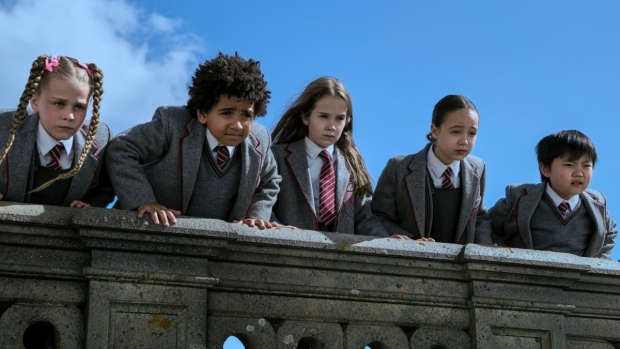Film Review: Matilda the Musical — Does the Movie Repeat the Stage Miracle?
Turns out it makes a pretty good go of it .

(© Dan Smith / Netflix)
A confession. Twelve years ago (almost to the day) my parents sat me down in front of their rickety PC and got me to sign myself and my siblings up for the RSC Key – a now (sadly retired) scheme to get young people into theatre. A few weeks later, with a trusty £5 ticket in my hand, we went to the temporary Courtyard Theatre in Stratford-upon-Avon to witness the birth of what has since become a musical juggernaut – the multi-award-winning Matilda, winner of many Tony Awards and possibly one of the biggest stage exports from the UK's subsidised sector this century.
Since 2010, composer Tim Minchin, writer Dennis Kelly and director Matthew Warchus' kooky production of Roald Dahl's much-loved children's tale about a woe-ridden schoolgirl who develops superpowers to overthrow her tyrannical headmistress Miss Trunchbull, has played in the West End, on Broadway and across the world in locations like the Philippines, Korea, South Africa, China and beyond. It's got countless fans, spawned many a musical career and marked the RSC's biggest commercial success since that whole palaver with the French barricades. But it holds a special place in my heart because I was there, with a £5 ticket, at the start of it all.
Why this is the case is a mystery. It may simply have been the bi-product of corporate juggling after Netflix's acquisition of the Road Dahl Story Company. Maybe US distributors were afraid that the shadow of the 1996 Matilda movie, courtesy of Danny DeVito, would be so long that it'd put any Americans off a new version, and decided against going for a riskier cinematic release.
Either way, it's a bit of a shame for our US colleagues, because this Matilda is a bright, buoyant bonanza of musical whimsy, that needs to be witnessed on the big screen in order to be served up at its sumptuous best. For UK fans it's also worth stating we won't be seeing it streamed until next summer.
Warchus, reuniting with Pride director of photography Tat Radcliffe to show a heightened sense of visual playfulness that suits the source material perfectly. On Pride, Warchus and Radcliffe presented an earnest, earthy, no-frills tone that let Stephen Beresford's screenplay do all the talking. Here – soaring shots, zoom punches and whirling whip-pans are on the menu – especially during big ensemble numbers "School Song" (featuring some of Minchin's punny alphabet-based lyrics) and "Revolting Children".
If it sounds visually anarchic, it is – but it's helped no end by Rob Howell's familiar costumes (another Matilda stage alum) and Anna Lynch-Robinson designs – creating a cohesive, primary-colour palette right from the show's technicolor opening number "Miracle" (delivered by Matt Henry as an ebullient obstetrician) – retaining the heart of what made the stage show so visually arresting.
Minchin's tunes are mostly retained (a few are left on the cutting room floor) and one new number, at the climax of the show, provides a much-needed duet between Matilda and her teacher-turned-protector Miss Honey – played in an understated but touchingly rich performance from Lashana Lynch, who also does everything right in her solo number "My House". Minchin, composer Chris Nightingale and music supervisor Becky Bentham also give the show's numbers a bit of a zhoosh-up – extra percussion in the opening number, some excellent counter-melodies in "School Song" and a more ominous "Chokey Chant".
Much was made of Emma Thompson's casting as the maniacal headteacher and Matilda's nemesis Miss Trunchbull (normally the role is given to a male actor, with Ralph Fiennes even said to be courted), but the Nanny McPhee and Love, Actually star gives a muscular, shrewd performance – distinguishable from the legendary Pam Ferris while still nailing all the aggressive comedy that writer Dennis Kelly pumps into every scene.
A lot of the film hinges, of course, on its titular performer – and Alisha Weir is truly a star find for the production. Completely different to the American Mara Wilson of the '90s flick, Weir brings an endearingly melancholic, 'wise-beyond-her-years' approach to her character: You truly believe that she blasted through the works of Austen before breakfast.
Kelly's script makes necessary wholesale cuts in order to keep pacing taut, meaning Stephen Graham and Andrea Riseborough's appalling parents have their screen time trimmed compared to brief comedic interludes. Most of the team's decisions are relatively canny – though proceedings slip somewhat during a CGI-laden finale that seems more Marvel-movie than Matilda. Nevertheless, it comes together in a cockle-warming conclusion that will leave audiences sailing out on a high like they've just been lobbed by their pigtails.
A slight tangent perhaps, but it's worth stating how much of this film is a celebration of British talent – from director, to writer, to the legions of creatives and on-screen talents of all ages. A lot of this could only happen if there is consistent support from the state – aiding education, institutions and more. If those in power needed more convincing that this is a sector in need of increased investment, here's a film teaching all the right kinds of lessons.










